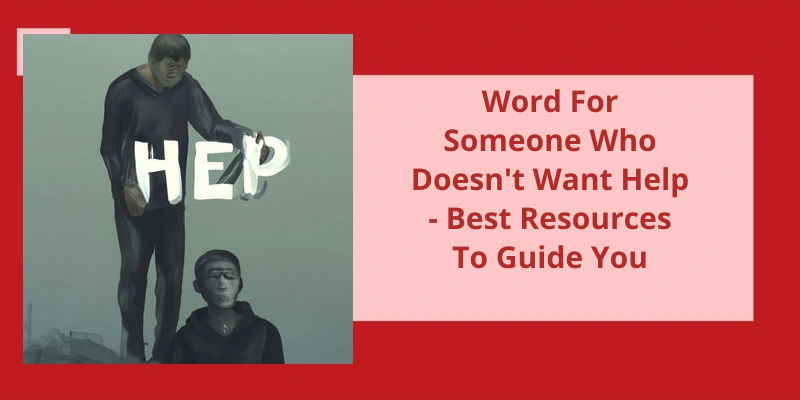In a world filled with diverse individuals, it’s essential to recognize that not everyone desires or welcomes the offer of assistance. Whether it’s due to personal pride, independence, or a deep-rooted need to solve problems on their own, there exists a unique word to encapsulate such individuals. While navigating through life, it can be challenging to find the right resources or guidance for individuals who don’t want help. However, with the vast array of resources available today, there are still many invaluable tools that can be utilized to guide and support those who prefer to face life's challenges independently. This article aims to explore these resources, offering the best guidance and means to guide those who don't want help towards finding their own paths and finding solutions to their challenges. From self-help books and online communities to personal development courses and therapeutic approaches, these resources cater to the needs of individuals who value self-reliance and seek empowerment through their own journey. So, if you or someone you know resonates with the notion of wanting to face life's difficulties without relying on external aid, join us as we delve into the best resources available to guide you on this unique path.
What Is a Word for Not Wanting to Ask for Help?
Many individuals possess a distinctive trait where they refrain from seeking assistance, advice, or aid from others. This quality can be attributed to a persons inclination towards self-reliance or an aversion to appearing vulnerable. When faced with challenges or obstacles, these individuals prefer the path of independence, relying solely on their own capabilities and resources to navigate through lifes complexities. It’s important to understand that not everyone who rejects help is necessarily stubborn; often, this trait is rooted in a desire for autonomy and a strong sense of individuality.
For those who resonate with this inclination, there are a variety of resources available to aid in navigating lifes challenges alone. Self-help books, online forums, and motivational speakers can offer guidance and strategies to develop self-reliance and problem-solving skills. Additionally, engaging in introspection and self-reflection can be valuable in understanding the underlying reasons behind this tendency and working towards personal growth and development.
The Importance of Building a Support Network Even for Self-Reliant Individuals
- Self-reliant individuals also need a support network
- A support network provides emotional and practical assistance
- It can help with personal growth and development
- Supportive relationships enhance overall well-being
- Networking can open doors to new opportunities
- Mentorship and guidance from others can be invaluable
- A support network can provide encouragement and motivation
- Sharing experiences with like-minded individuals can be empowering
- Having a support network reduces feelings of isolation
- Even self-reliant individuals benefit from collaboration and teamwork
When it comes to helping someone who’s resistant to receiving mental help, it can be a challenging and delicate process. Rather than forcing or cornering them, there are alternative approaches that can be effective in facilitating their acceptance. These methods involve active listening, validating their feelings, asking open-ended questions, refraining from offering immediate solutions, and exploring options together. Additionally, finding support for yourself can also be crucial in navigating through this situation with care and empathy.
How Do You Get Through to Someone Who Doesn’t Want Help?
When it comes to dealing with someone who doesn’t want help, it can be a challenging and delicate situation. However, there are proven strategies that can be effective in getting mental help to those who’re resistant. One approach is to simply listen and validate their feelings. By providing a safe space for them to express themselves without judgment, you’re showing empathy and understanding, which can help to build trust.
Another approach is to try asking open-ended questions. This can encourage the person to think more deeply about their situation and potentially open up to the idea of seeking help. By engaging in a non-confrontational conversation, you create an environment where they feel heard and respected.
An important aspect of helping someone who doesn’t want help is to resist the urge to fix or give advice. Instead of imposing your own solutions, it’s crucial to empower the person to explore their options and make decisions for themselves. This can help them regain a sense of control and autonomy.
Additionally, involving the person in the process of finding resources and support can be beneficial. By exploring different options together, such as researching treatment options or community organizations, they may become more willing to consider seeking help.
Lastly, it’s important to remember to find support for yourself. Seeking guidance from friends, family, or a therapist can provide you with the support and guidance you need to navigate this complex situation.
Building Trust and Rapport With Someone Resistant to Help
- Show empathy and genuine interest in their perspective
- Active listening and acknowledging their feelings
- Respecting their autonomy and choices
- Building a foundation of trust through consistent and transparent communication
- Offering support without imposing solutions
- Providing information and resources to empower them
- Being patient and understanding of their resistance
- Recognizing and validating their concerns
- Highlighting shared goals and finding common ground
- Consistently demonstrating reliability and follow-through
- Utilizing open-ended questions to encourage deeper conversations
- Offering reassurance and emphasizing the benefits of seeking help
- Showing appreciation for their willingness to engage in discussions
Being a helpful person goes beyond just lending a hand; it’s about embodying the qualities of compassion, empathy, and generosity. Your willingness to go the extra mile and make a positive impact on someone’s life is what sets you apart. Whether it’s through small gestures or grand acts, a helpful person is someone who brings joy, support, and comfort to those around them.
How Do You Describe a Helpful Person?
A helpful person is often described as someone who goes out of their way to assist others in any situation. They possess a strong inclination to lend a helping hand, offering their aid and support whenever it’s needed. This individual possesses a genuine desire to make a positive impact in the lives of others, consistently striving to make things easier for those around them. Their actions are a reflection of their helpful nature and can be seen in even the smallest gestures, such as holding the door open for someone or offering a comforting word.
This helpful habit becomes ingrained in their character, as they consistently find ways to offer assistance and make a difference in the lives of others. It isn’t simply a fleeting moment of kindness, but rather a consistent and dependable trait that defines and distinguishes them from others. They’re reliable and trustworthy, with a reputation for their helpfulness preceding them.
In todays world, helpful people are a valuable resource and can provide immense guidance and support. They can offer a wealth of knowledge, advice, and resources to those seeking help. There are countless books, articles, and online resources available that can provide guidance on how to be helpful and offer support to others. These resources can provide invaluable insight into the traits and skills of helpful individuals, allowing us to learn from their experiences and apply their wisdom to our own lives.
They possess a genuine desire to make a positive impact in the lives of those around them and offer their aid and support whenever it’s needed.
The Importance of Being a Helpful Person in Society
Being a helpful person in society is of great importance. When we offer our assistance to others, we not only make a positive impact on their lives but also contribute to building a stronger and more supportive community. Helping others cultivates empathy, compassion, and a sense of unity among individuals.
However, it’s essential to recognize that some people may not always want help, even if they’re in need. This could be due to personal preferences, cultural factors, or a desire to maintain independence. Respecting their autonomy and understanding their perspective is crucial in these situations.
There are various ways to be helpful without imposing our assistance on others. One approach is to provide resources and guidance that individuals can access voluntarily. By offering information and pointing people towards reliable sources, we empower them to make informed decisions and seek help when they’re ready.
Have empathy and active listening skills when engaging with others, and be prepared to respect their choices even if it differs from what you believe to be best for them. By being a helpful person who understands the importance of autonomy, you contribute to a more inclusive and supportive society.
One of the traits that can describe a person who consistently disregards advice is stubbornness. This individual tends to resist guidance or suggestions, often driven by their strong determination to follow their own path. Such individuals may also be viewed as heedless or self-confident, demonstrating a persistent unwillingness to consider alternative viewpoints or recommendations.
What Do You Call a Person That Doesn’t Take Advice?
When it comes to seeking and accepting advice, there are individuals who possess a strong inclination towards independence and self-reliance. They may refuse or ignore guidance from others, displaying a distinct personality trait. Such individuals can be characterized as stubborn, heedless, or self-confident. Their refusal to heed advice may not necessarily stem from arrogance or a lack of humility, but rather from a deeply embedded sense of self-assurance.
Stubbornness is often associated with individuals who’re unwilling to consider alternative perspectives or viewpoints. They hold their own beliefs firmly and are reluctant to accept suggestions or guidance from others. This stubbornness may arise from a desire to assert their independence and maintain control over their own decisions and actions.
In certain situations, individuals may exhibit a lack of eagerness or reluctance to lend a helping hand, often described as being unwilling. Whether it’s hesitating to part with money or being unenthusiastic about assisting others, this disposition can be contrasted with it’s opposite, willingness. When someone is willing, they display a readiness and openness to offer their aid when required.
What Is a Word for Not Wanting to Help?
When it comes to finding the right word to describe someone who doesn’t want to help, one frequently used term is “unwilling.”. It captures the essence of not being ready or willing to offer assistance or support. For instance, you might say, “She was unwilling to hand over the money,” indicating her lack of desire to extend help in that particular situation. Similarly, you could describe someone as a “very unwilling helper,” emphasizing their reluctance to lend a hand.
On the opposite end of the spectrum, the word “willing” serves as a direct antonym to “unwilling” and conveys a willingness to provide aid or support. For example, you might say, “Im more than willing to help out if needed,” expressing your readiness and eagerness to offer assistance.
While these two terms capture the concept of being helpful or unhelpful, it’s important to remember that individuals willingness to help can vary depending on circumstances or personal preferences. Therefore, it’s essential to approach each situation with an open mind and consider alternative resources to guide you, should you encounter someone who doesn’t want to help. Exploring various avenues, such as seeking advice from experts, consulting relevant literature or online resources, or reaching out to a different network of individuals, can offer valuable insights and alternative solutions. These resources provide a broader perspective and help you navigate situations where you encounter people who might not be inclined to offer assistance.
So what’s a synonym for willingness to help? There are numerous words that can be used to convey this attitude, such as aid, assist, collaborate, comply with, conspire, and contribute. In the following sections, we will explore these synonyms and their nuances in more detail.
What Is a Synonym for Willingness to Help?
What’s a synonym for willingness to help? On this page youll find 67 synonyms, antonyms, and words related to show willingness, such as: aid, assist, collaborate, comply with, conspire, and contribute.
When it comes to describing someone who’s willing to lend a hand, there are a plethora of words to choose from. Whether they’re assisting, aiding, collaborating, or conspiring, these individuals showcase their willingness to help in various ways.
In a world where teamwork and cooperation are essential, it’s refreshing to come across individuals who comply with the needs of others. Their eagerness and readiness to assist contribute greatly to the success of any project or task at hand.
To find the best resources that guide you on how to foster this willingness to help, it’s crucial to explore platforms that offer relevant information and insights. Online communities, blogs, and forums can be excellent sources of advice and guidance in this regard.
Furthermore, seeking out self-help books and articles written by experts in the field can provide valuable strategies and techniques to cultivate a desire to assist others. These resources can offer practical tips and actionable steps to encourage a mentality of helpfulness.
In addition to written material, attending workshops or seminars that focus on personal development and empathy can also be instrumental in fostering a willingness to help. These interactive sessions allow individuals to engage with like-minded individuals and learn from experienced facilitators who provide guidance based on their expertise.
Overall, whether you’re looking to expand your own willingness to help or seeking resources to guide you in encouraging others to do so, the key lies in finding the right information and tools. By utilizing the numerous synonyms and related words provided here, you can further enhance your understanding of the concept and unlock the potential for greater cooperation and collaboration in various aspects of life.
The Ethics of Helping Others and Setting Boundaries
- Respecting personal autonomy and choice
- Considering the long-term impact of help
- Avoiding paternalism or a savior complex
- Providing assistance without expecting anything in return
- Fostering empowerment rather than dependency
- Setting clear boundaries and communicating expectations
- Recognizing individuals’ right to refuse help
- Ensuring cultural sensitivity and avoiding imposition
- Avoiding manipulation or coercion
- Practicing self-care to maintain personal well-being
Source: synonyms for show willingness – Thesaurus.com
Conclusion
In conclusion, it’s essential to acknowledge that there may be individuals who’re resistant to accepting help or seeking assistance. However, it’s important to provide support and guidance without imposing it upon them. Understanding the diverse reasons behind their reluctance to seek help is crucial. Fortunately, there are numerous resources available to offer guidance and insight on how to navigate such situations. These resources can help individuals build empathy and develop effective communication strategies that can foster a non-threatening environment for individuals not wanting help. By utilizing these resources, we can foster understanding, respect personal autonomy, and offer assistance in a way that aligns with the needs and desires of those who may be hesitant to accept it.






